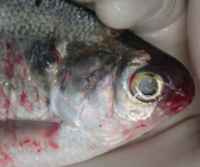
Photo from wikipedia
Bacteriocins are emerging as a viable alternative to antibiotics due to their ability to inhibit growth or kill antibiotic resistant pathogens. Herein, we evaluated the ability of the bacteriocin Garvicin… Click to show full abstract
Bacteriocins are emerging as a viable alternative to antibiotics due to their ability to inhibit growth or kill antibiotic resistant pathogens. Herein, we evaluated the ability of the bacteriocin Garvicin KS (GarKS) produced by Lactococcus garvieae KS1546 isolated from cow milk to inhibit the growth of fish and foodborne bacterial pathogens. We found that GarKS inhibited the growth of five fish L. garvieae strains isolated from infected trout and eels. Among fish pathogens, GarKS inhibited the growth of Streptococcus agalactiae serotypes Ia and Ib, and Aeromonas hydrophila but did not inhibit the growth of Edwardsiella tarda. In addition, it inhibited the growth of A. salmonicida strain 6421 but not A. salmonicida strain 6422 and Yersinia ruckeri. There was no inhibition of three foodborne bacterial species, namely Salmonella enterica, Klebsiella pneumoniae, and Escherichia coli. In vitro cytotoxicity tests using different GarKS concentrations showed that the highest concentration of 33 µg/mL exhibited low cytotoxicity, while concentrations ≤3.3 µg/mL had no cytotoxicity on CHSE-214 and RTG-2 cells. In vivo tests showed that zebrafish larvae treated with 33 µg/mL and 3.3 µg/mL GarKS prior to challenge had 53% and 48% survival, respectively, while concentrations ≤0.33 µg/mL were nonprotective. Altogether, these data show that GarKS has a broad inhibitory spectrum against Gram positive and negative bacteria and that it has potential applications as a therapeutic agent for a wide range of bacterial pathogens. Thus, future studies should include clinical trials to test the efficacy of GarKS against various bacterial pathogens in farmed fish.
Journal Title: International Journal of Molecular Sciences
Year Published: 2022
Link to full text (if available)
Share on Social Media: Sign Up to like & get
recommendations!